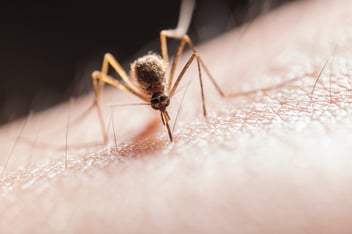West Nile Virus was recently detected in Massachusetts.
 It can be easy to wonder where the summer went with August just around the corner, but summer is still very much with us. It’s been hot, and it’s been damp – perfect if you’re a mosquito. That means we’re still at risk of mosquito-borne diseases like West Nile Virus and EEE; in fact, WNV was recently confirmed in a Boston-area mosquito. To help you stay vigilant, here’s what you should know about West Nile Virus in Massachusetts.
It can be easy to wonder where the summer went with August just around the corner, but summer is still very much with us. It’s been hot, and it’s been damp – perfect if you’re a mosquito. That means we’re still at risk of mosquito-borne diseases like West Nile Virus and EEE; in fact, WNV was recently confirmed in a Boston-area mosquito. To help you stay vigilant, here’s what you should know about West Nile Virus in Massachusetts.
What is It?
WNV is a virus spread to mosquitoes that feed on infected birds. The virus is then passed to humans through the bite of an infected mosquito.
What are the Symptoms?
People that contract WNV sometimes have no symptoms at all; if symptoms appear, they tend to be flu-like in nature, such as fever, nausea, fatigue, and headache. Symptoms of severe infection can range from weakness or confusion to paralysis or coma.
Because not all people display symptoms, it is difficult to tell exactly how many humans have been infected.
What is the Treatment?
There is currently no vaccine or specific medicine for WNV infection. For mild cases, managing symptoms is key; in severe infections, hospitalization may be necessary.
How Can I Reduce My Risk?
- Wear long-sleeved shirts and pants
- Make sure window and door screens are fully intact and close completely
- Eliminate standing water and harborage areas in your yard
- Use EPA-approved repellents
- Avoid spending time outdoors during dawn and dusk, peak times for mosquito activity
For added protection, call the mosquito control team at Burgess Pest Management. From standalone mosquito and tick programs to our popular P10+MT Plan, we make it our business to Protect Your Pad – and an estimate is always free.
For Even More Information:
Download a copy of our Summer Pest Guide


